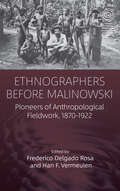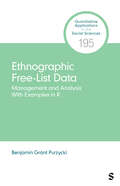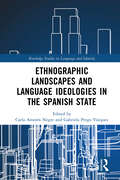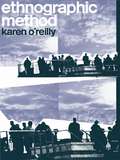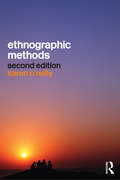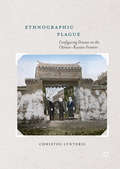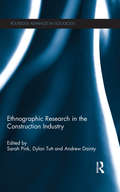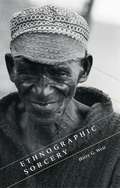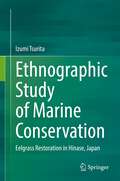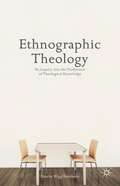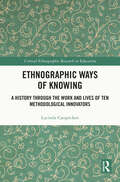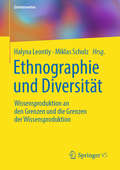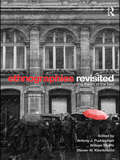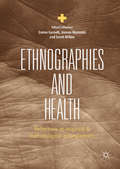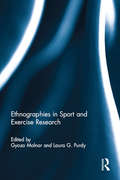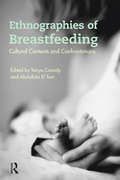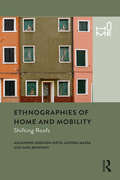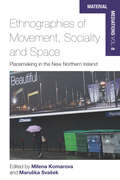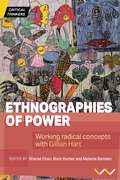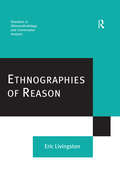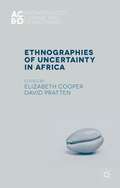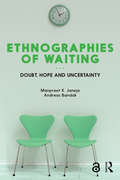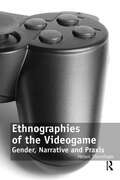- Table View
- List View
Ethnographers Before Malinowski: Pioneers of Anthropological Fieldwork, 1870-1922 (EASA Series #44)
by Frederico Delgado Rosa and Han F. VermeulenFocusing on some of the most important ethnographers in early anthropology, this volume explores twelve defining works in the foundational period from 1870 to 1922. It challenges the assumption that intensive fieldwork and monographs based on it emerged only in the twentieth century. What has been regarded as the age of armchair anthropologists was in reality an era of active ethnographic fieldworkers, including women practitioners and Indigenous experts. Their accounts have multiple layers of meaning, style, and content that deserve fresh reading. This reference work is a vital source for rewriting the history of anthropology.
Ethnographic Free-List Data: Management and Analysis With Examples in R (Quantitative Applications in the Social Sciences)
by Benjamin Grant PurzyckiEthnographic Free-List Data: Management and Analysis With Examples in R details a method that involves research participants listing what they know or think about the researcher’s topic of interest. While researchers typically report these free-list analyses in isolation, this book incorporates them with other analytical methods and demonstrates how ethnographic free-lists can be useful to a broad social science audience. The first half of the book covers descriptive methods, and the second half incorporates insights from the early chapters into a predictive statistical framework. Author Benjamin Grant Purzycki explains how to collect, clean, and manage free-list data and how to use R to calculate and visualize the data.
Ethnographic Free-List Data: Management and Analysis With Examples in R (Quantitative Applications in the Social Sciences)
by Benjamin Grant PurzyckiEthnographic Free-List Data: Management and Analysis With Examples in R details a method that involves research participants listing what they know or think about the researcher’s topic of interest. While researchers typically report these free-list analyses in isolation, this book incorporates them with other analytical methods and demonstrates how ethnographic free-lists can be useful to a broad social science audience. The first half of the book covers descriptive methods, and the second half incorporates insights from the early chapters into a predictive statistical framework. Author Benjamin Grant Purzycki explains how to collect, clean, and manage free-list data and how to use R to calculate and visualize the data.
Ethnographic Landscapes and Language Ideologies in the Spanish State (Routledge Studies in Language and Identity)
by Carla Amorós Negre Gabriela Prego VázquezThis book offers a multi-contributor view on the linguistic landscape research in Spain, focusing on both monolingual and bilingual regions of Spain with an interest in initiatives that promote social and linguistic justice without neglecting migrant and international languages in the territory. The agency of speakers is highlighted, as well as the processes of linguistic hybridization and identity claims that are created in Spain. This volume analyzes the semiotic meaning of different languages, varieties, and discursive practices in different Spanish contexts from an ethnographic, multimodal, and critical perspective. It observes how some languages, varieties, and repertoires are privileged in top-down institutional environments, whilst others respond to bottom-up initiatives that contemplate complex processes of identity construction in Spain, in order to decide whether or not a greater balance between majority and minority languages is achieved in different contexts and spaces nowadays.
Ethnographic Methods
by Karen O'Reilly<p>Ethnography isn't a prescribed set of methods - it's a methodology that acknowledges the complexity of human experience and the need to research it by close and sustained observation of human behaviour. In this comprehensive, yet concise introduction, Karen O'Reilly introduces the reader to the technical, practical and philosophical issues that arise when employing traditional and innovative research methods in relation to human agents. She invites the reader to engage in reflexive and creative research that draws critically and creatively from the full range of qualitative methods. <p>Using case studies of students' work to illustrate the dilemmas and resolutions that an ethnographic researcher may encounter, this textbook guides the reader from the initial design and planning stages through to the analysis and writing-up. It explores the historical and philosophical foundations of ethnographic research and goes on to cover a range of relevant topics such as participant observation, qualitative interviews, (focus) group interviews and visual data collection and analysis. <p>Designed primarily for undergraduates, this book incorporates complex methodological debates which will also engage more experienced researchers, perhaps coming to ethnography for the first time.</p>
Ethnographic Methods
by Karen O'ReillyThis new edition of Karen O’Reilly’s popular Ethnographic Methods provides a comprehensive and accessible introduction to the technical, practical and philosophical issues that arise when employing traditional and innovative research methods in relation to human agents. Using a wide range of case studies and source material to illustrate the dilemmas and resolutions that an ethnographic researcher may encounter, this textbook guides the reader from the initial design and planning stages through to the analysis and writing-up. It explores the historical and philosophical foundations of ethnographic research and goes on to cover a range of relevant topics such as participant observation, qualitative interviews, (focus) group interviews and visual data collection and analysis. Having been substantially revised and updated, the second edition includes new discussions of emerging practices such as reflexive ethnography and autoethnographic accounts, as well as an entire chapter dedicated to new directions in the field – including virtual, mobile, multi-sited and global ethnography.
Ethnographic Plague
by Christos LynterisChallengingthe concept that since the discovery of the plague bacillus in 1894 the studyof the disease was dominated by bacteriology, Ethnographic Plague argues for the role of ethnography as a vitalcontributor to the configuration of plague at the turn of the nineteenthcentury. With a focus on research on the Chinese-Russian frontier, where aseries of pneumonic plague epidemics shook the Chinese, Russian and JapaneseEmpires, this book examines how native Mongols and Buryats came to beunderstood as holding a traditional knowledge of the disease. Exploring theforging and consequences of this alluring theory, this book seeks to understandmedical fascination with culture, so as to underline the limitations of theemployment of the latter as an explanatory category in the context ofinfectious disease epidemics, such as the recent SARS and Ebola outbreaks.
Ethnographic Research in the Construction Industry (Routledge Advances in Sociology)
by Sarah Pink Andrew Dainty Dylan TuttThe construction industry as a workplace is commonly seen as problematic for a number of reasons, including its worrying health and safety record, the instability of its workforce, and the poorly regulated nature of the sector. It is surprising therefore, that the sector and its working practices remain so under-theorised. Now though, there is a growing interest in and awareness of the utility of an ethnographic approach to the construction industry. Ethnographic Research in the Construction Industry draws together in one volume a set of expert contributions which demonstrate how social science perspectives, rooted in ethnographic research on construction sites and with construction workers themselves, can generate fresh insights into the social, cultural and material ways that the industry and conditions of work in it are experienced and played out. Each chapter develops discussion on the basis of an ethnographic case study to examine how theoretically informed ethnographic research can help us understand industry problems, and can challenge common perceptions of the construction industry. This book will be of interest to students and scholars of anthropology, sociology, geography and organization studies, as well as those from the built environment and related applied fields.
Ethnographic Sorcery
by Harry G. WestAccording to the people of the Mueda plateau in northern Mozambique, sorcerers remake the world by asserting the authority of their own imaginative visions of it. While conducting research among these Muedans, anthropologist Harry G. West made a revealing discovery---for many of them, West's efforts to elaborate an ethnographic vision of their world was itself a form of sorcery. In Ethnographic Sorcery, West explores the fascinating issues provoked by this equation. A key theme of West's research into sorcery is that one sorcerer's claims can be challenged or reversed by other sorcerers. After West's attempt to construct a metaphorical interpretation of Muedan assertions that the lions prowling their villages are fabricated by sorcerers is disputed by his Muedan research collaborators, West realized that ethnography and sorcery indeed have much in common. Rather than abandoning ethnography, West draws inspiration from this connection, arguing that anthropologists, along with the people they study, can scarcely avoid interpreting the world they inhabit, and that we are all, inescapably, ethnographic sorcerers.
Ethnographic Study of Marine Conservation: Eelgrass Restoration in Hinase, Japan
by Izumi TsuritaThis book explores the nature of marine conservation based on the case study of Hinase, a fishing village in Okayama, Japan. It focuses on the fishers’ self-motivated eelgrass restoration activity which has been continued for more than 30 years. This activity in Hinase recently attracted international attention as a case under the name “Satoumi” and “Marine Protected Areas” in several governmental reports, but detailed information, such as the historical background and social structure of Hinase, has not yet been analyzed. This book, therefore, fulfills this gap by providing its ethnographic information. In addition, this book offers some points for critical thinking by concluding that marine conservation activities cannot always be evaluated or arranged under the standardized approach with limited time and space. This viewpoint reaffirms the importance of local initiative and highlights the value of qualitative research to seek the way forward for promising marine conservation. This book is suitable for an academic audience in the field of social sciences, such as applied anthropology, as well as ecologists, government officials, environmentalists, and citizens who are interested or engaged in environmental issues or natural resource management.
Ethnographic Theology: An Inquiry into the Production of Theological Knowledge
by Natalie Wigg-StevensonThis book uses ethnography as theological practice, yielding a theology constructed at the intersection of church, academy and everyday life. Drawing on the author's research in her Baptist church, the resulting 'ethnographic theology' produces creative theological insights, while also proposing fresh alternatives for Christian thought and action.
Ethnographic Ways of Knowing: A History Through the Work and Lives of Ten Methodological Innovators (Critical Ethnographic Research in Education)
by Lucinda CarspeckenDrawing on the works of ten scholars and public intellectuals ranging over 200 years, this book foregrounds ways of knowing that include but go beyond the cognitive.The book explores the work of Harriet Martineau, Jane Addams, W. E. B. Du Bois, Zora Neale Hurston, Ella Deloria, M. N. Srinivas, Barbara Myerhoff, Orlando Fals Borda, Ronald Takaki and Nawal El Saadawi. The author discusses their multifaceted ethnographic practices and argues that such practices are still under-acknowledged in contemporary research in comparison to cognition and categorization. These scholars were outsiders to their societies in a variety of ways. They highlighted power imbalances in the perception and representation of one group by another and brought direct experience, emotion, narrative, imagination, recognition, self-reflection, activism and cultural humility into their writing, in addition to rationality. The book engages with the authors and their ideas in the context of their times and places. It also reclaims them as methodological predecessors, noting their contributions to what educational ethnography has been and what it could be in the future.Expanding the canon of social research history and providing insight into unique methodological forms, this text will be valuable for scholars and postgraduate students with interests in ethnography, as well as the history of research, anthropology and qualitative methods more broadly.
Ethnographie und Diversität: Wissensproduktion an den Grenzen und die Grenzen der Wissensproduktion (Erlebniswelten)
by Halyna Leontiy Miklas SchulzIm Mittelpunkt des Bandes steht die ethnografisch orientierte Forschungspraxis. Sie wird im Spiegel der in den Kultur- und Sozialwissenschaften aktuell kontrovers verhandelten Konzepte Diversität und Intersektionalität reflektiert. Besondere Aufmerksamkeit wird der Frage gewidmet, wie Forschende mit dem methodischen Problem der Produktion, Reproduktion und Reflexion von Kategorien umgehen. Welche Kategorien werden schon an das ‚Feld‘ herangetragen, später revidiert oder verfestigt und welche Kategorien begleiten schließlich den Interpretationsprozess und welche konstituieren die Ergebnisdarstellung? Wie und warum entstehen sie? Und nicht zuletzt: Wie werden durch (Forschungs-)Kategorien spezifische Erlebniswelten menschlicher Vielfalt mit hervorgebracht oder transformiert?Der InhaltKonzeptionelle Grundlagen • Diversität und Inklusion in Bildungskontexten • Interkultur in der Diversität • Diversität im Spannungsfeld von Körper, Geschlecht und BehinderungDie HerausgebendenDr. Halyna Leontiy ist Wissenschaftliche Mitarbeiterin am Zentrum für Gender- und Diversitätsforschung (ZGD) an der Universität Tübingen und seit November 2019 Gastwissenschaftlerin am Interdisziplinären Zentrum für Integrations- und Migrationsforschung (InZentIM) der Universität Duisburg-Essen.Dr. phil. Miklas Schulz vertritt seit dem Sommersemester 2019 die Professur Inklusive Pädagogik und Diversität am Institut für Erziehungswissenschaft der Universität Duisburg-Essen und ist Wissenschaftlicher Mitarbeiter (beurlaubt) am Institut für Sonderpädagogik an der Leibniz Universität Hannover.
Ethnographies Revisited: Constructing Theory in the Field
by William Shaffir Antony J. Puddephatt Steven W. KleinknechtEthnographies Revisited provides first-hand accounts of how leading qualitative researchers crafted key theoretical concepts found in their major book-length ethnographies. Great ethnographic research lies not in the rigid execution of prescribed methodological procedures, but on the unrelenting cultivation of theoretical ideas. These contributors focus squarely on this neglected topic, providing reflexive accounts of how research decisions were made in light of emerging theoretical questions. The continuous generation of creative concepts is arguably the most important skill in developing powerful results in field research, since the originality of the ideas produced is how the study is ultimately judged. Yet, this topic is often taken for granted, treated rigidly and artificially, or is entirely absent from existing qualitative research manuals. In contrast, this volume offers candid insights of how leading ethnographers generated their initial questions, chose their research sites, made theoretical and methodological adjustments, and oriented their research to maximize the conceptual payoff, leading to such successful research contributions. This provides a fresh approach to the topic of qualitative research, by linking practical decisions in the field to the dynamic features of theory in the making, told through the first-hand experiences of some of the best ethnographers in our field.
Ethnographies and Health: Reflections on Empirical and Methodological Entanglements
by Emma Garnett Joanna Reynolds Sarah MiltonThis edited collection explores the multiple ways in which ethnography and health emerge and take form through the research process. There is now a plethora of disciplinary engagements with ethnography around the topic of health, including anthropology, sociology, geography, science and technology studies, and in health care professions such as nursing and occupational therapy. This dynamic and evolving landscape means ethnography and health are entangled in new and different ways, providing a timely opportunity to explore what these entanglements do and affect in the social production of knowledge. Rather than discussing the strengths (and limitations) of ethnography for engaging with health, the book asks: what does ethnography enable, make visible and possible for knowing and doing health in contemporary research settings and beyond?
Ethnographies in Sport and Exercise Research
by Gyozo Molnar Laura PurdyEthnography has become an important method for researching and interpreting the social world, not least in the field of sport and exercise studies. Ethnographies in Sport and Exercise Research is the first book to provide a contemporary overview of the current state of ethnographic research and its application within sport and exercise, introducing and explaining a range of well-established and emerging ethnographic approaches. Featuring a heavyweight line-up of sport and exercise researchers, the book is divided into three parts. The first considers the methodological and theoretical aspects of ethnographic research, including: a history of ethnography in sport and exercise research the definition of the ethnographic field methods of gathering ethnographic data methods of representing ethnographic research. In the second part of the book, a series of chapter-length case studies, spanning sports from boxing to fell running and themes from gender to fandom, demonstrate the challenges and rewards of ethnographic research in the context of sport and exercise, helping students and researchers to develop a solid understanding of qualitative research at both a theoretical and a practical level. The final part of the book considers future directions for ethnographic research, including an evaluation of its place in the expanding field of study in sport management. A comprehensive assessment of the statement of ethnographic research in sport, Ethnographies in Sport and Exercise Research is invaluable reading for any research methods course taken as part of a degree programme in sport and exercise, and a useful reference for all active researchers.
Ethnographies of Breastfeeding: Cultural Contexts and Confrontations (Criminal Practice Ser.)
by Tanya Cassidy Abdullahi El TomBreastfeeding is an intimate and deeply rooted bodily practice, as well as a highly controversial sociocultural process which invokes strong reactions from advocates and opponents. Touching on a wide range of issues such as reproduction, sexuality, power and resources, and maternal and infant health, the controversies and cultural complexities underlying breastfeeding are immense.Ethnographies of Breastfeeding features the latest research on the topic. Some of the leading scholars in the field explore variations in breastfeeding practices from around the world. Based on empirical work in areas such as Brazil, West Africa, Darfur, Ireland, Italy, France, the UK and the US, they examine the cross-cultural challenges facing mothers feeding their infants.Reframing the traditional nature/culture debate, the book moves beyond existing approaches to consider themes such as surrogacy, the risk of milk banks, mother-to-mother sharing networks facilitated by social media, and the increasing bio-medicalization of breast milk, which is leading its transformation from process to product. A highly important contribution to global debates on breast milk and breastfeeding.
Ethnographies of Home and Mobility: Shifting Roofs (Home Ser.)
by Alejandro Miranda Nieto Aurora Massa Sara BonfantiThis book lays out a framework for understanding connections between home and mobility, and situates this within a multidisciplinary field of social research. The authors show how the idea of home offers a privileged entry point into forced migration, diversity and inequality. Using original fieldwork, they adopt an encompassing lens on labour, family and refugee flows, with cases of migrants from Latin America, Africa and the Indian subcontinent. With the book structured around these key topics, the authors look at how practices of home and mobility emerge along with emotions and manifold social processes. In doing so, their scope shifts from the household to streets, neighbourhoods, cities and even nations. Yet, the meaning of 'home' as a lived experience goes beyond place; the authors analyse literature on migration and mobility to reveal how the past and future are equally projected into imaginings of home.
Ethnographies of Movement, Sociality and Space: Place-Making in the New Northern Ireland (Material Mediations: People and Things in a World of Movement #8)
by Maruška Svašek Milena KomarovaExploring the complex dynamics of twenty-first century spatial sociality, this volume provides a much-needed multi-dimensional perspective that undermines the dominant image of Northern Ireland as a conflict-ridden place. Despite touching on memories of “the Troubles” and continuing unionist-nationalist tensions, the volume refuses to consider people in the region as purely political beings, or to understand processes of placemaking solely through ethnic or national contestations and territoriality. Topics such as the significance of friendship, gender, and popular culture in spatial practices are considered, against the backdrop of the growing presence of migrants, refugees and diasporic groups.
Ethnographies of Power: Working Radical Concepts with Gillian Hart
by Mark Hunter Michael Ekers Alex Loftus Stefan Kipfer Bridget Kenny Sharad Chari Zachary Levenson Jennifer Greenburg Melanie Samson Jennifer A Devine Ahmed VeriavaWorking with key concepts from theorist and human geographer Gillian Hart, this book argues for an ethnographic and geographic approach to critically engage contemporary political-economic processes in the context of real world struggles.
Ethnographies of Reason (Directions in Ethnomethodology and Conversation Analysis)
by Eric LivingstonWritten by one of the most eminent scholars in the field, Ethnographies of Reason is a unique book in terms of the studies it presents, the perspective it develops and the research techniques it illustrates. Using concrete case study materials throughout, Eric Livingston offers a fundamentally different, ethnographic approach to the study of skill and reasoning. At the same time, he addresses a much neglected topic in the literature, illustrating practical techniques of ethnomethodological research and showing how such studies are actually conducted. The book is a major contribution to ethnomethodology, to social science methodology and to the study of skill and reasoning more generally.
Ethnographies of Social Support
by Markus Schlecker Friederike FleischerWhy do elderly choose to move away from their children so as to not receive their support? Using a number of case studies, contributors explore social support as a tool of mutuality, or maintaining relatedness and sharing feelings, rather than preventing or patching up problems. This book helps correct the dominant framework of deliberate action.
Ethnographies of Uncertainty in Africa
by Elizabeth Cooper David PrattenThis collection explores the productive potential of uncertainty for people living in Africa as well as for scholars of Africa. Eight ethnographic case studies from across the continent examine how uncertainty is used to negotiate insecurity, create and conduct relationships, and act as a source for imagining the future.
Ethnographies of Waiting: Doubt, Hope and Uncertainty (Criminal Practice Ser.)
by Manpreet K. Janeja Andreas BandakWe all wait – in traffic jams, passport offices, school meal queues, for better weather, an end to fighting, peace. Time spent waiting produces hope, boredom, anxiety, doubt, or uncertainty. Ethnographies of Waiting explores the social phenomenon of waiting and its centrality in human society. Using waiting as a central analytical category, the book investigates how waiting is negotiated in myriad ways. Examining the politics and poetics of waiting, Ethnographies of Waiting offers fresh perspectives on waiting as the uncertain interplay between doubting and hoping, and asks "When is time worth the wait?" Waiting thus conceived is intrinsic to the ethnographic method at the heart of the anthropological enterprise. Featuring detailed ethnographies from Japan, Georgia, England, Ghana, Norway, Russia and the United States, a Foreword by Craig Jeffrey and an Afterword by Ghassan Hage, this is a vital contribution to the field of anthropology of time and essential reading for students and scholars in anthropology, sociology and philosophy.
Ethnographies of the Videogame: Gender, Narrative and Praxis
by Helen ThornhamEthnographies of the Videogame uses the medium of the videogame to explore wider significant sociological issues around new media, interaction, identity, performance, memory and mediation. Addressing questions of how we interpret, mediate and use media texts, particularly in the face of claims about the power of new media to continuously shift the parameters of lived experience, gaming is employed as a 'tool' through which we can understand the gendered and socio-culturally constructed phenomenon of our everyday engagement with media. The book is particularly concerned with issues of agency and power, identifying strong correlations between perceptions of gaming and actual gaming practices, as well as the reinforcement, through gaming, of established (gendered, sexed, and classed) power relationships within households. As such, it reveals the manner in which existing relations re-emerge through engagement with new technology. Offering an empirically grounded understanding of what goes on when we mediate technology and media in our everyday lives Ethnographies of the Videogame is more than a timely intervention into game studies. It provides pertinent and reflexive commentary on the relationship between text and audience, highlighting the relationships of gender and power in gaming practice. As such, it will appeal to scholars interested in media and new media, gender and class, and the sociology of leisure.
